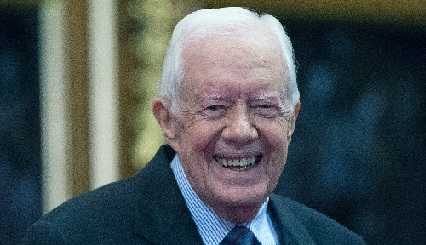
13 Mar 2023; MEMO: The man responsible for leading the resignation of 15 members of the Carter Centre's Board of Councillors in 2007, over former US President Jimmy Carter's criticism of Israel has announced his apology to the ailing figure, admitting that Carter was right about Israel becoming an apartheid state.
In an article published last week by the American Jewish news outlet, The Forward, titled 'I was wrong about Israel. I apologised. Then President Carter gave me a lesson in grace,' Steve Berman – a former member of the Carter Centre's Board of Councillors from 2005 to 2007 – recounted his and other Board members' reactions to Carter's 2006 book 'Palestine: Peace not Apartheid', in which the former President identified Israel's occupation of and persecution in Palestinian territories as apartheid.
Stating that "I felt that even my left-of-centre sensibilities had been betrayed", he said he "wasn't convinced" by Carter's reasoning that, although Israel was apparently not yet an apartheid state at the time, but that it "was moving toward this state of affairs by its ongoing occupation of the West Bank".
Berman then led 15 members of the Board of Councillors to resign in 2007, but wrote that "in the intervening years, I realised that he [Carter] was likely right". Citing his deep ties with Israel and his children and grandchildren's subsequent connection with the country, Berman admitted that, over time, "I came to realise that the Jewish state was, indeed, burying its head in the sand. Israel was not facing the demographic realities, and was fast becoming a state that could not be both democratic and Jewish."
He criticised both the Israeli left which seemed "more consumed by espressos and stock options than with peace" and the Israeli right which focuses on deals such as the Abraham Accords "with nations thousands of miles away instead of any meaningful attempts to address the occupation taking place in its own backyard."
READ: Jimmy Carter: the first (and only) US president to identify Israeli apartheid
In that climate, Berman said, he "kept thinking about Carter's prediction that apartheid was in Israel's future if leadership kept ignoring the general direction of the country". Eight years ago, he then felt compelled to write to Carter to apologise, admitting to him that "as of late, I had started to view Israel's occupation of the Palestinians as something that started in 1967 as an accident but was now becoming an enterprise with colonial intentions."
Carter replied to him shortly afterward, in a handwritten note which read: "You have no reason to apologise, but I accept your wonderful letter as you obviously intend it. I sympathise & understand the feelings of my many friends, who reacted as you did. Best wishes, Jimmy Carter. P.S. You would be welcome back at the Carter Centre. JC."
Berman said he "was shaken and inspired by his humility. Carter owed me nothing, yet gave me a sense there is a capacity within us all for unconditional love."
As the 98-year-old Jimmy Carter was, last month, admitted to home hospice care in what seems to be his final days, Berman urged that "Before it is too late, American Jews should apologise to Jimmy Carter, and thank him for everything he has done for us and the world."
Famed for his administration's brokering of the Camp David Accords of 1978 and the Israeli-Egyptian peace agreement, Carter has broken from the usual unconditional American pro-Israel bias by frequently and consistently advocating against Israel's occupation and for Palestinian rights and statehood over almost two decades.
In 2014, he slammed Tel Aviv for not being committed to a two-state solution, urged US policy to be less biased towards it, and called for Washington to recognise the Palestinian Resistance group, Hamas, as a legitimate political force. More recently, in 2020, Carter condemned former President Donald Trump's 'deal of the century' as breaching international law.




